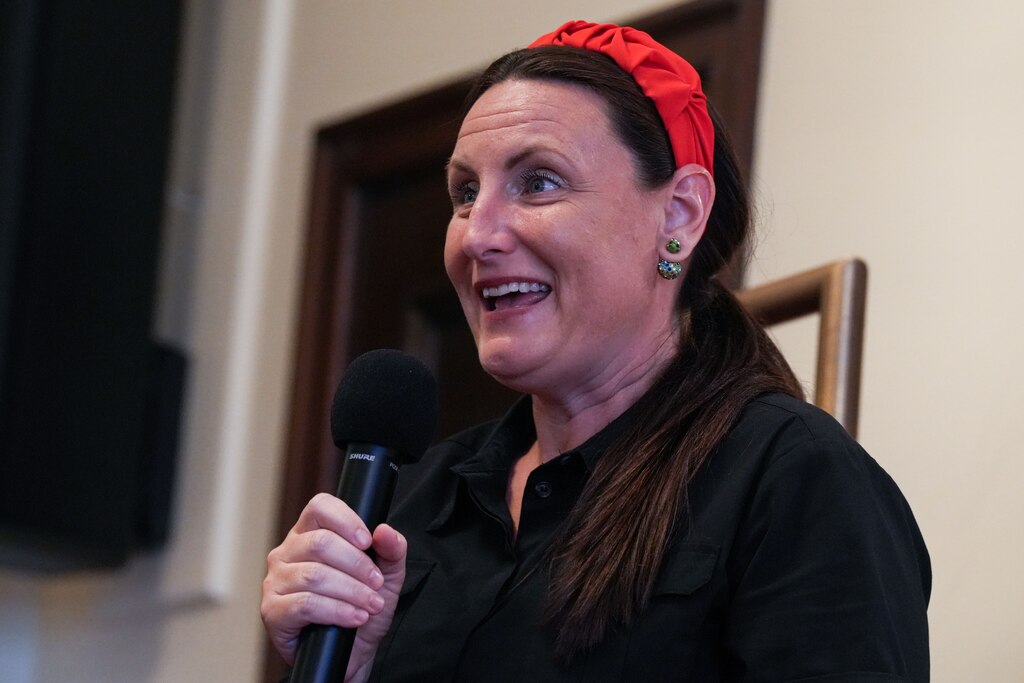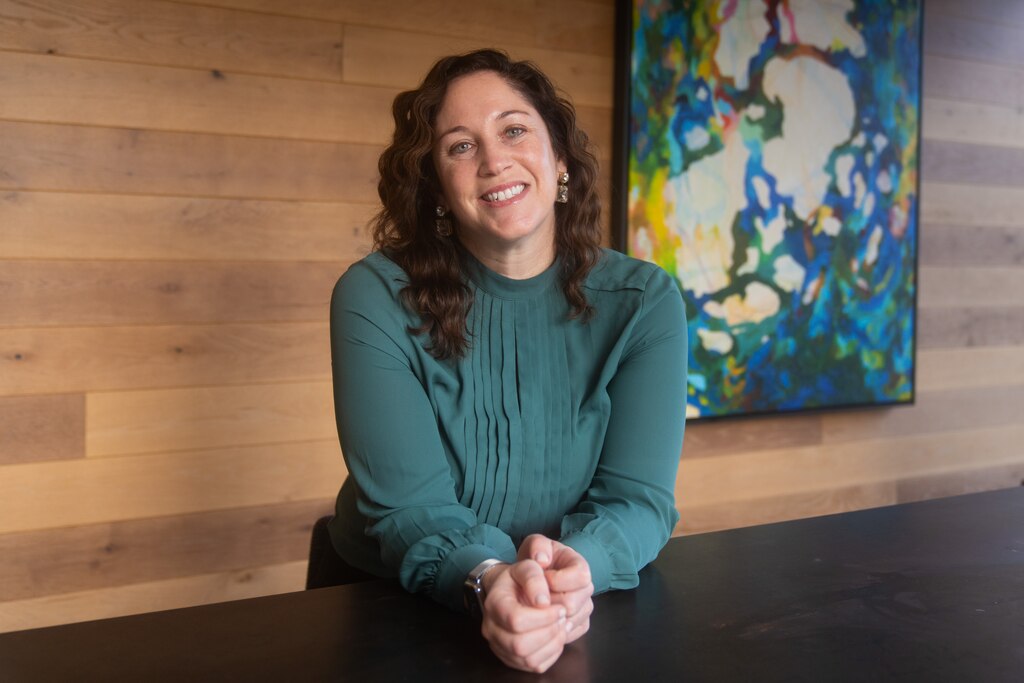Megan Outten could feel the lightning bolt of energy last month when she heard about the 160,000 white women who joined a Zoom call to support Kamala Harris’ presidency.
“The intense wave that we saw from every pocket of the American community was absolutely inspiring. It filled a lot of individuals with hope of what’s to come in November,” the 31-year-old Salisbury resident said. “Finally, we are getting to a point where the rest of America is walking side by side.”
Although Outten was not on the call — she was busy going door-to-door helping support fellow Democratic candidates in local and state races — she has thrown her support behind Harris, who she says is “bringing all of America to the ticket.”
Outten, a former City Council member in Salisbury, is not alone. According to a recent New York Times poll, Harris, a Democrat, has an 11-point advantage over Republican candidate Donald Trump when it comes to women.
But when it comes to the nation’s largest voting demographic — white women — will they elect the first woman president in Harris? History says it’s unlikely.
Only twice since 1950 have a majority of white women voted for a Democratic presidential candidate — Lyndon Johnson and Bill Clinton. They didn’t support Barack Obama in his two historic terms as the nation’s first Black president. And they didn’t help elect Hillary Rodham Clinton as the nation’s first woman president.
Instead, they supported Trump over the former secretary of state 47% to 45%, according to Pew Research. Four years later, Trump’s share of white women voters increased to 53% in his unsuccessful reelection bid against President Joe Biden.
In Maryland, one of the most diverse states in the nation, white women are the largest voting bloc, comprising 25.9% of the voting age population. White men are the second-largest group at 24.9%. Black women, historically the most loyal demographic to the Democratic Party, account for 16%, according to a Banner analysis.
No public data exists to determine exactly how Maryland’s white women have voted in past presidential elections, and exit polling has been spotty because Maryland is not a battleground state. The state is reliably blue, with Democratic candidates often winning by 25 percentage points or more.
But that hasn’t always helped other barrier-breaking Democratic candidates. The state did not elect Kathleen Kennedy Townsend, who is white, as the state’s first woman governor in 2002. And Republican former Gov. Larry Hogan defeated two men seeking to be the state’s first Black governor, Anthony Brown and Ben Jealous, in 2014 and 2018. Against Jealous, 64% of white women voted for Hogan, according to AP exit poll data.
“I can’t speak for generations that came before. But we are ready to see our first female president. Kamala Harris has already demonstrated the sheer broad support for her presidency,” said Outten, who is the chair of the Women’s Commission for Wicomico County.

This election could be different, according to Mileah Kromer, Director of the UMBC Institute of Politics. Kromer sees a turning of the tide in the white women demographic — particularly when factors such as age and reproductive rights are at play.
“The Republican party has given them an issue that matters to them,” Kromer said.
Trump’s running mate J.D. Vance hasn’t done the ticket any favors among women — particularly those outraged by the overturn of Roe v. Wade and Vance’s 2021 comments about prominent Democrats — including Harris, who has two step-children — being “childless cat ladies.”
“The childless cat comment will have staying power because Democrats will not let it go. You already have famous white women like Jennifer Aniston expressing their frustrations,” Kromer said.
Kromer admits that even though reproductive rights were a prominent issue when Hillary Rodham Clinton ran — the then presidential candidate warned that women could lose their rights under a Trump-appointed Supreme Court — the court’s 2022 ruling eliminating a constitutional right to abortion was still hypothetical.
“The threat and the reality of living without it is a different thing,” she said.
Kromer warns that white women are not a monolith.
“It’s about winning white women on the margins, and just like other demographics, they are not monolithic — especially when it comes to the generational dynamic,” she said.
Kromer predicts that younger women voters could make the difference in this election — especially because they are more progressive than older white women. National polls have shown the gender split is especially pronounced in young voters, with Trump growing his support among young men.
“These are women of reproductive age,” she said.
Sophia Silbergeld, a political fundraiser based in Baltimore, has noticed an uptick in donations for Harris — especially following the series of Zoom fundraisers from different demographic groups.
“Money is not the be-all and end-all, but it is a reflection of voter enthusiasm and the amount that the Harris campaign has raised in just a short amount of time shows a whole lot of enthusiasm,” she said.
“I hope that this time around white women will understand both what an opportunity we have to make history by voting for Kamala Harris in to the White House, and what’s at stake if we don’t,” Silbergeld said.
SIlbergeld warned that Democrats need to do a better job with messaging, which has been their downfall in past elections.
Obama, Rodham Clinton and Biden’s campaigns did not use proper messaging to white women voters, she said.
“Democrats have to message to every demographic why our party makes the biggest difference for good in their lives, and that we are the party that works for them.”

Susan Stein, who is white and Jewish and lives in Bethesda, said the choice is clear: Harris for president and Angela Alsobrooks for U.S. Senate.
“I’m [originally] from New York. We already knew about Trump. It’s one thing to watch him on TV and be entertained on ‘The Apprentice.’ But it’s another to see him be a candidate. For the sake of democracy, it’s a very easy choice,” she said.
Stein, 62, said she’s “extremely disappointed” knowing that so many white women vote for Trump and have traditionally voted for Republican candidates.
“In general, there are many people who don’t vote in their best economic and cultural interest,” she said, adding that she has “close friends” who are going to vote for Trump.
“I would say, in a very strange way, it could be white supremacy issues. You hate to say that about people you are close to,” she said.
The promise of electing the first woman president was not enough to sway Maria High to vote for Rodham Clinton in 2016. The baggage of Rodham Clinton enabling her husband — who High believes is a sexual predator — matched with her not being relatable to “non-career-oriented” people, made the Mount Vernon resident vote for independent candidate Jill Stein.
In Harris, High, an independent, sees a woman who does not look like she comes from the “exclusive culture of very wealthy people.”
“I’m a very community-based person and a very nurturing and inclusive type of person and I think of my needs and the people around me,” the 53-year-old said.
High, who said her most pressing voting issue is education, said her only hesitation with Harris is the state of the world right now.
“The world on fire right now. A lot of people are dying. And our money is going to that. People who want that to stop — their voices are being cut off. We’re not able to help. … I’m hopeful that is something she is going to address. It’s definitely not something [Trump] will address.”
Black women were the first demographic to show up and financially support Harris, with 44,000 Black women joining a Zoom call to mobilize for the vice president in July. Since then, other groups have hosted similar demographically oriented events.
They aren’t as optimistic that white women will break ranks and support a Black and Asian woman to lead this country.
The mistrust not only stems from white women’s voting record, but from a deep internal divide between the two groups.
Many reference Sojourner Truth’s “Ain’t I A Woman” speech in 1851, which was delivered three years after Black women were not included at the white women-led 1848 Seneca Falls meeting for women’s rights. Others reference the sizable wage gap that exists between white and Black women, where white women earn 83% of the earnings of white men compared to the 70% earned by Black women, according to a 2022 Pew Research Center study.
Karen Miller, the state’s only Black woman political fundraiser, believes that white women will support Harris in this election “if only but for the searing glare of all eyes on them.”
She added that Alsobrooks might not ride Harris’ coattails.
“I’m betting that white women would rather enthusiastically vote for Harris and consider Alsobrooks their Queen’s sacrifice,” she said.
Nykidra “Nyki” Robinson, founder of Black Girls Vote, a national nonpartisan organization, said she’s not betting on white women showing up and supporting Harris when it’s time to vote.
She looked back to the 2016 election, where on Election Day white women marched to Susan B. Anthony’s grave and put flowers on her tombstone in anticipation of Rodham Clinton being elected the nation’s first woman president.
“However, what we saw was the electorate and white women decided to vote otherwise, often aligning with their husband’s views,” Robinson said.
“I am personally uncertain, and I don’t want to say it, but history oftentimes repeats itself,” she said.
Baltimore Banner data reporter Ramsey Archibald contributed to this story.





Comments
Welcome to The Banner's subscriber-only commenting community. Please review our community guidelines.